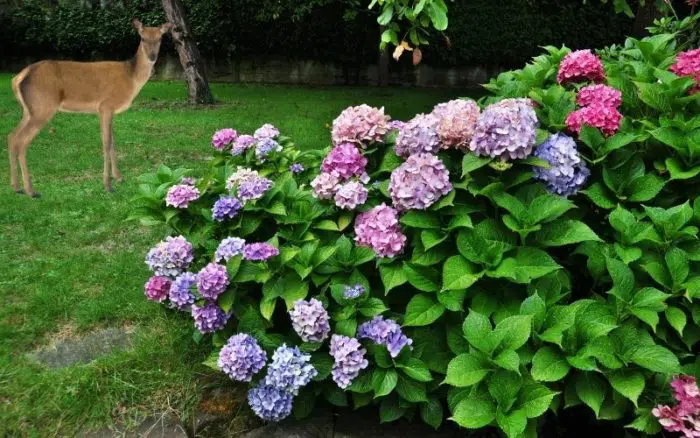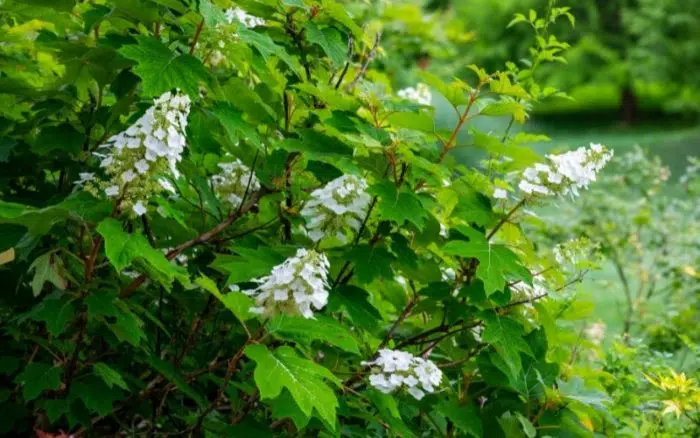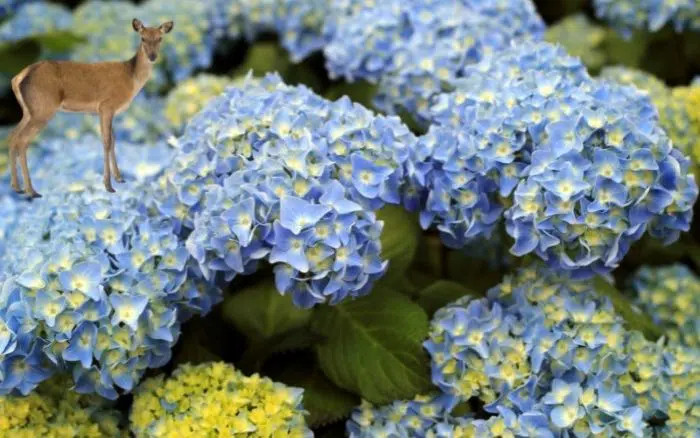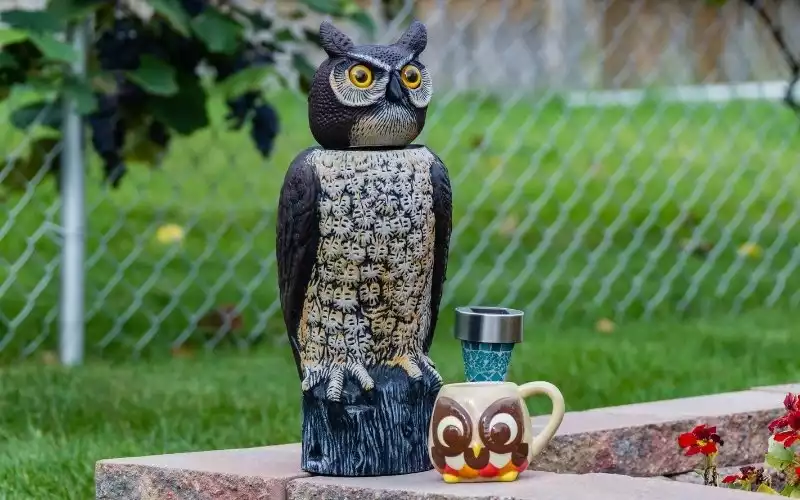There is a lot of debate over whether or not deer eat hydrangeas. Some people claim that the deer will only eat the leaves and flowers if there is no other food available, however, there is a lot of evidence that deer will eat hydrangeas if they come across them in their travels.
Do Deer Eat Hydrangeas?
Deer are grazers, and will eat lots of varieties of food. And unfortunately, deer do like to eat hydrangeas, and occasionally severely damage the plants.
While deer won’t seek out hydrangeas as their favorite food, they will absolutely take a bite if they are hungry enough and nearby.
Will Deer Eat the Whole Hydrangea Plant?
Hungry deer can and will eat a large portion of the plant. The flower buds, leaves, and even the bark are all fair game for deer.

Deer tend to munch on the flowers and leaves, but during the winter they can take nibbles of the bark as well, so keep the plant covered in winter is a good idea.
What Do Deer Generally Eat?
As herbivores, the local deer populations like to snack on bushes, plants, fruit trees, and nuts or acorns.
Deer love to eat leafy foliage and many types of flowers. Unfortunately, since hydrangea bushes have both of those, they are often a good target for deer.
Hydrangeas are one type of flower that deer enjoy eating, but they eat many others including pansies, roses, petunias, marigolds, geraniums, and more.
How to Keep Deer From Eating Your Hydrangeas
While it can be difficult to keep deer away from are several ways to protect your hydrangeas from being eaten by deer, including using fencing or repellents.
1. Grow Climbing Hydrangeas or Oakleaf Hydrangeas
While no hydrangeas are deer proof, climbing hydrangeas are not as exciting to deer as a typical hydrangea bush is. Growing these climbing varieties can help save your plants.

Oakleaf hydrangeas (Hydrangea quercifolia) is one of the deer resistant hydrangea varieties. They are just as visually appealing as many other varieties, with their beautiful white flowers, but deer prefer other types when looking for a meal.
2. Red Cat Eyes
These fake red eyes are great for keeping nocturnal animals out of the garden, and while deer aren’t fully nocturnal, these work for keeping them from eating hydrangea plants.
What a genius idea! These solar-powered lights create an eerie glow in your garden to help simulate a large predator and deter:
- Deer
- Fox
- Raccoons
- Coyote
- Skunk
- Cats
3. Motion-Activated Sprinkler
Deer can be skittish, so hearing loud noises and seeing a lot of movement can scare them away. A motion-activated sprinkler can absolutely do the trick.
I used one of these this season and it’s a great way to keep animals away from the garden. Squirrels have been ravaging my tomatoes every other minute, but not anymore.
Here is a video of my sprinkler in action:
Make sure you set up a trail cam to watch all the animals run as fast as they can away from your garden 🙂
A motion activated sprinkler works wonders for keeping animals (and people!) out of your yard. It sprays intermittently as it detects continuous motion so animals won't get used to the timing of it.
4. Garden or Deer Netting
It’s not called deer netting to keep out rabbits. 🙂
If the netting is setup the right way, it can keep deer out. But if you just set it up the same way you would a fence, they can easily jump it. It really should be placed overtop the garden, instead of as a fence.
5. Deer Repellent Sprays
This stuff is pretty gross, and no wonder rotten eggs work to keep deer out. The main ingredient in this popular spray is whole egg, followed by garlic and cloves. Gross, but those pungent smells really do help keep deer out.

6. Companion Planting
You can also use an age-old method of companion planting, which is essentially planting hydrangeas near other crops and vegetables that act as deer deterrents.
Some deer resistant plants include:
- Garlic
- Daffodils
- Lavender
- Herbs like sage, rosemary, and dill
Deer are not fans of strong smells, and that’s exactly what garlic offers.
Fend Off Sticks have a strong garlic odor which is great as deer repellents
Here are some other deer resistant plants to try out including flowers, vegetables, and perennials.
7. Nylon Stockings with Soap
Got some extra Irish Spring soap laying around? Add it inside of a nylon stocking and hang it from a nearby tree branch. This scent is quite good at keeping deer out of the area.
8. Plastic Owl or Scarecrow
Placing a fake predator nearby can help keep the deer at least mindful of where they are. While this alone isn’t going to stop them from eating hydrangeas, it will help along with red cat eyes or strong odors.
Fake owls are great for keeping many animals out of the garden, including squirrels, deer, birds, and more.
9. Fencing
One of the best ways to protect your plants is to put up a fence around them. This will keep the deer out and allow the plants to grow without being eaten.
Deer can easily jump short fences, so if you’re going to go this route, you’ll want to put up a wire fence that is at least 7-8 feet tall.
You can also invest in an electric fence to help keep your vegetable garden and precious hydrangea blooms safe.
Fences also help keep animals like raccoons and rabbits from eating your hydrangeas.
10. Human Hair or Animal Hair
If a deer comes across your garden or backyard and smells a predator or human scent, this can help deter deer away from your plants. Although, some people have limited success with this, you can try animal urine as well.
11. Hot Pepper Spray
Similar to the deer repellent above, hot pepper sprays are great for keeping them out of the hydrangea patch.
12. Get Rid of the Bird Bath
If you have a birdbath in your backyard or garden, deer can use it as a water source. Once they’re nearby, they’ll realize there is some free food nearby. Take away the water, and you can help ease some of the destruction.
Will Hydrangeas Grow Back if Eaten by Deer?
If a deer has gotten ahold of your hydrangea plant, don’t worry too much as these plants are quite resilient! Unless they’ve severely damaged the plant, hydrangeas can recover from deer damage.
Are Hydrangeas Deer Resistant?
Most hydrangea species are a good meal for a deer. While they won’t attract deer by themselves, the growing deer populations are always looking for a snack and hydrangea flowers might be just the ticket!
You can protect plants with strong scents, a tall fence, and even some deer netting.





